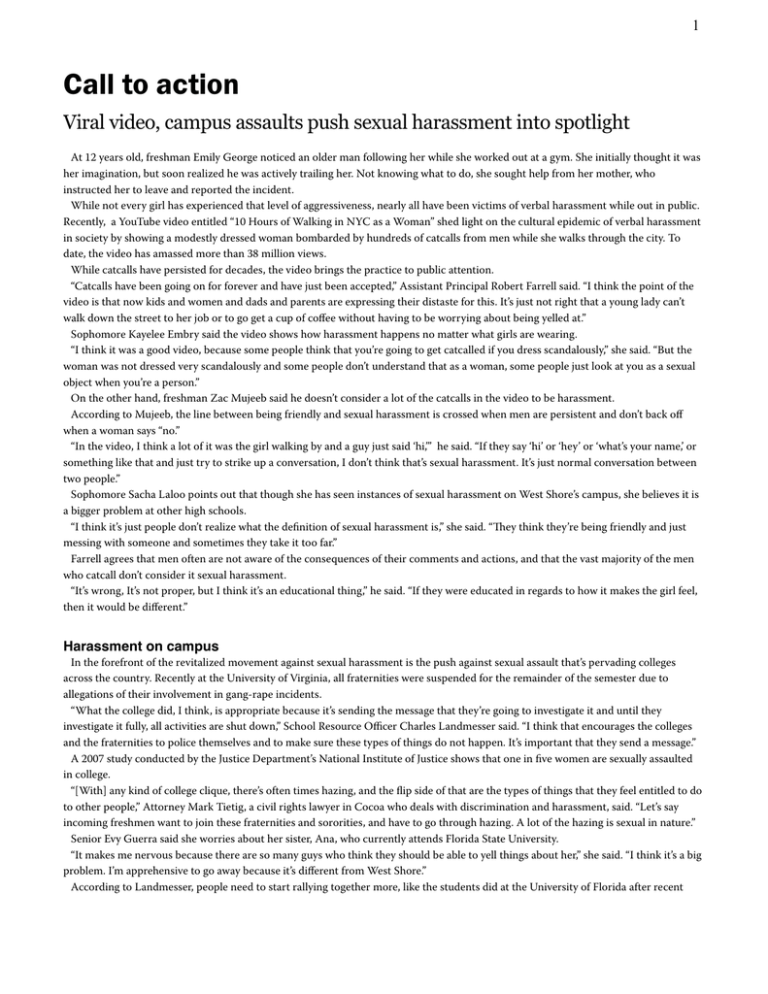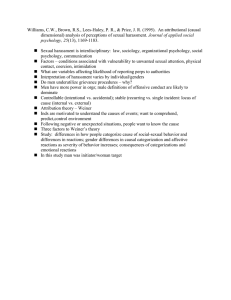
1
Call to action
Viral video, campus assaults push sexual harassment into spotlight
At 12 years old, freshman Emily George noticed an older man following her while she worked out at a gym. She initially thought it was
her imagination, but soon realized he was actively trailing her. Not knowing what to do, she sought help from her mother, who
instructed her to leave and reported the incident.
While not every girl has experienced that level of aggressiveness, nearly all have been victims of verbal harassment while out in public.
Recently, a YouTube video entitled “10 Hours of Walking in NYC as a Woman” shed light on the cultural epidemic of verbal harassment
in society by showing a modestly dressed woman bombarded by hundreds of catcalls from men while she walks through the city. To
date, the video has amassed more than 38 million views.
While catcalls have persisted for decades, the video brings the practice to public attention.
“Catcalls have been going on for forever and have just been accepted,” Assistant Principal Robert Farrell said. “I think the point of the
video is that now kids and women and dads and parents are expressing their distaste for this. It’s just not right that a young lady can’t
walk down the street to her job or to go get a cup of coffee without having to be worrying about being yelled at.”
Sophomore Kayelee Embry said the video shows how harassment happens no matter what girls are wearing.
“I think it was a good video, because some people think that you’re going to get catcalled if you dress scandalously,” she said. “But the
woman was not dressed very scandalously and some people don’t understand that as a woman, some people just look at you as a sexual
object when you’re a person.”
On the other hand, freshman Zac Mujeeb said he doesn’t consider a lot of the catcalls in the video to be harassment.
According to Mujeeb, the line between being friendly and sexual harassment is crossed when men are persistent and don’t back off
when a woman says “no.”
“In the video, I think a lot of it was the girl walking by and a guy just said ‘hi,’” he said. “If they say ‘hi’ or ‘hey’ or ‘what’s your name,’ or
something like that and just try to strike up a conversation, I don’t think that’s sexual harassment. It’s just normal conversation between
two people.”
Sophomore Sacha Laloo points out that though she has seen instances of sexual harassment on West Shore’s campus, she believes it is
a bigger problem at other high schools.
“I think it’s just people don’t realize what the definition of sexual harassment is,” she said. “ey think they’re being friendly and just
messing with someone and sometimes they take it too far.”
Farrell agrees that men often are not aware of the consequences of their comments and actions, and that the vast majority of the men
who catcall don’t consider it sexual harassment.
“It’s wrong, It’s not proper, but I think it’s an educational thing,” he said. “If they were educated in regards to how it makes the girl feel,
then it would be different.”
Harassment on campus
In the forefront of the revitalized movement against sexual harassment is the push against sexual assault that’s pervading colleges
across the country. Recently at the University of Virginia, all fraternities were suspended for the remainder of the semester due to
allegations of their involvement in gang-rape incidents.
“What the college did, I think, is appropriate because it’s sending the message that they’re going to investigate it and until they
investigate it fully, all activities are shut down,” School Resource Officer Charles Landmesser said. “I think that encourages the colleges
and the fraternities to police themselves and to make sure these types of things do not happen. It’s important that they send a message.”
A 2007 study conducted by the Justice Department’s National Institute of Justice shows that one in five women are sexually assaulted
in college.
“[With] any kind of college clique, there’s often times hazing, and the flip side of that are the types of things that they feel entitled to do
to other people,” Attorney Mark Tietig, a civil rights lawyer in Cocoa who deals with discrimination and harassment, said. “Let’s say
incoming freshmen want to join these fraternities and sororities, and have to go through hazing. A lot of the hazing is sexual in nature.”
Senior Evy Guerra said she worries about her sister, Ana, who currently attends Florida State University.
“It makes me nervous because there are so many guys who think they should be able to yell things about her,” she said. “I think it’s a big
problem. I’m apprehensive to go away because it’s different from West Shore.”
According to Landmesser, people need to start rallying together more, like the students did at the University of Florida after recent
2
sexual assault allegations.
“I think [at] times people [and] students don’t want to get involved because they’re afraid of retaliation or think it doesn’t concern
them,” he said. “And I think as a whole everybody has to stand up for it, [whether] it’s a community at West Shore or college, [they] have
to stand up for one another.”
Harassment online
Sexual harassment is as prominent in the virtual world as in the physical one, with video games being brought into the limelight recently. e
previously male-dominant community now has more women than men.
Anita Sarkeesian, a feminist video blogger who speaks publicly about misogyny in video games, made international headlines when she
received death threats because of a planned lecture on the subject at Utah State University earlier this year.
According to senior Joe Along, a staff writer for a video game community website, misogyny and sexual harassment are no more prevalent in
the video gaming community than in society as a whole, but active participation online gives gamers a platform from which to lash out.
“e gaming community for a long time has been almost exclusively male and it was sort of underground,” he said. “As women are getting
more and more involved in video games, they’re starting to look at some of the video games that have misogynistic undertones and they’re
trying to bring light to the social context of video games.”
Senior Gabii Reyes, an active gamer, said she has noticed misogyny in the video games she plays. In fact, she wrote her senior paper on gender
stereotypes in video games.
“I feel like it’s kind of newer since online gaming is starting to become more of a thing, but [the portrayal of] women in gaming has always
been a problem,” she said. “e first character to really be a female was from ‘Mario’ and ‘Donkey Kong’ and she was just a princess that
just said ‘save me.’ en, the first good female character was Lara Croft, and she wore a bikini and booty shorts, so it’s always been a
problem with women being sexualized in video games.”
Reyes said harassment towards women while playing games can take the fun out of the experience.
“I feel like [harassment] does happen a lot, especially in online gaming,” she said. “Girls can play with guys and usually a girl talks
on the game and a guy hears it, [so] they start to make derogatory comments and jokes and stuff at girls. A lot of times, it happens to
them once and then they stop playing.”
Along said he thinks the solution entails conditioning male players to be more accepting of women.
“I think society as a whole lacks some restraint,” he said. “I think that’s perpetuated by social media. Your ability to say whatever you
want and have it unfiltered allows for less-thought-out comments and that tends to lean towards these harassment problems that we’re
seeing.”
Itʼs personal
Because of an increased focus on sexual attention in the media, women are starting to talk more openly about it, and coming
forward with personal anecdotes, willing to share their experiences, like when juniors Gracie Parish and Megan Ward were shopping
in a Barnes and Noble a few years ago. ey rebuffed two men in their mid 40s who tried to talk to them, but when the girls left the
store, the men followed by car.
“We had to lose them, and when I got home I filed a police report with their license plate,” Parish said. “It was so scary.”
Cross-country team member Hannah Keats said she often is subjected to harassment while training.
“I get a lot of car honks and things like that,” she said. “It’s just irritating, and it’s actually kind of scary. It makes me feel really bad
about leaving my house to run. I try to run on a track as much as I can.”
Sophomore Alyssa Carrasco said women need to come out about incidents they encounter instead of being silent. She added the
harassment is only going to get worse.
“ey teach girls that we shouldn’t leave our drinks unattended instead of teaching the boys that they shouldn’t spike people’s
drinks,” she said. “I feel like it should be taught more to the boys to not do bad things than it should be taught to the girls to prevent
it.”





